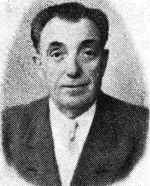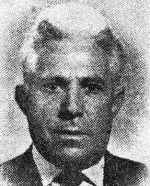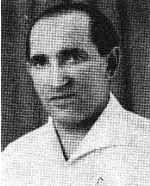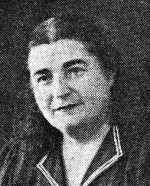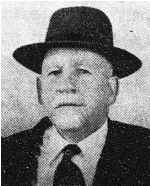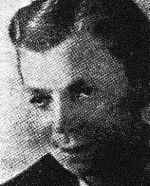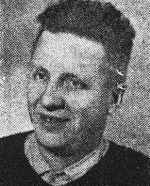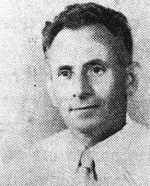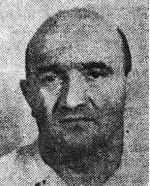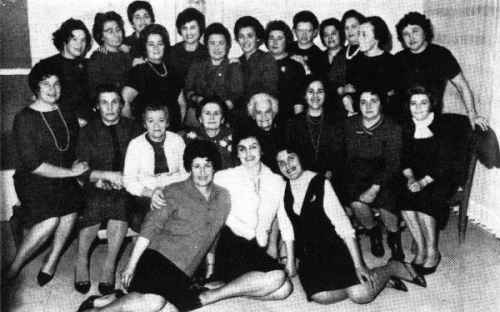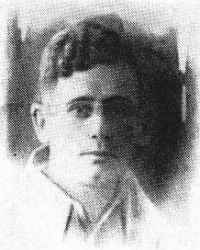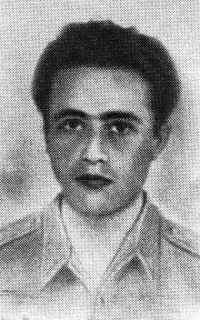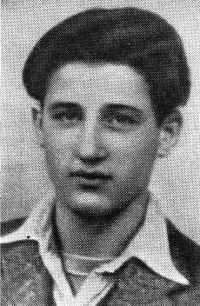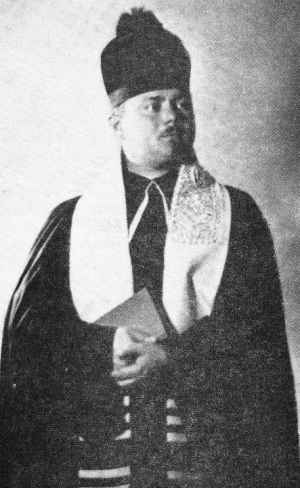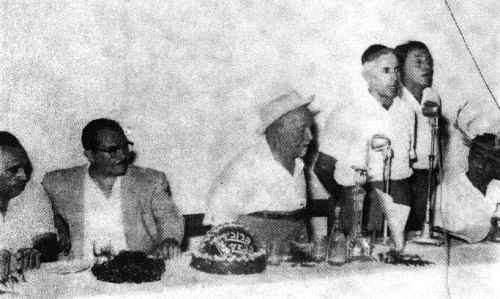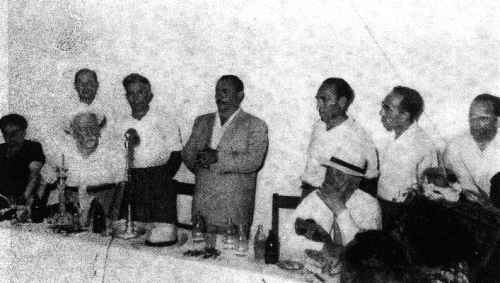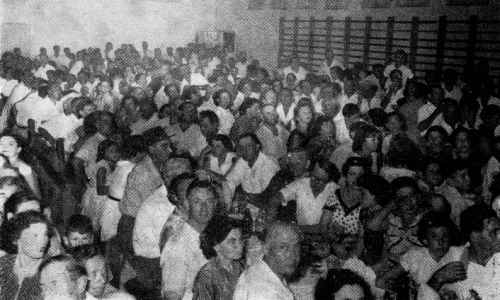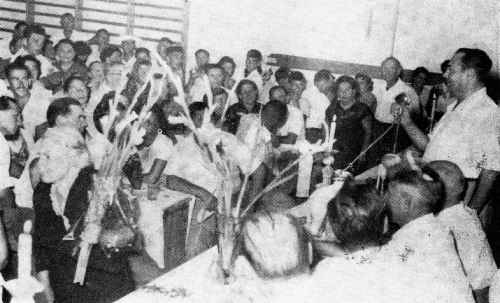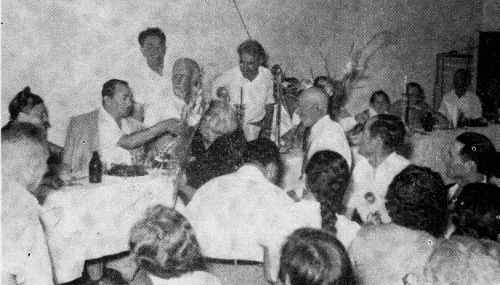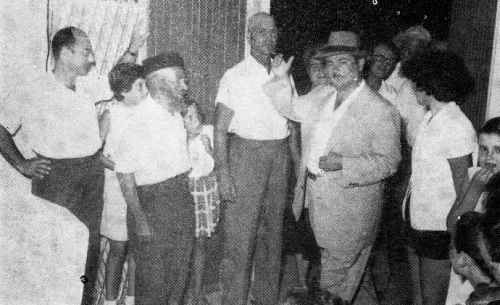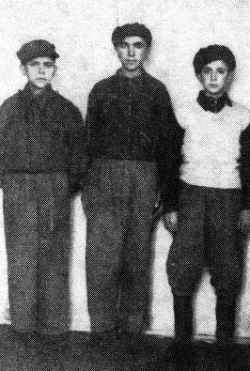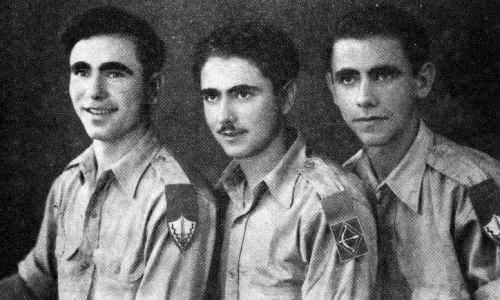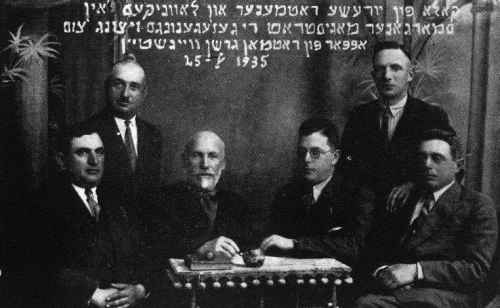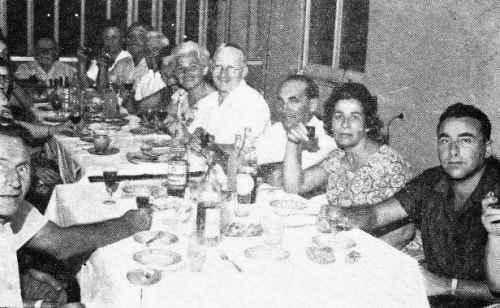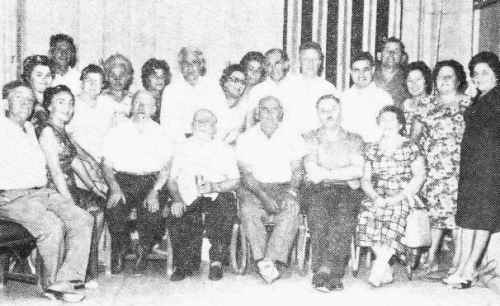[Page 611]
The Activities of the Board
by Baruch Sutzkower
Translated by Jerrold Landau
When we, the Smorgon natives in Israel, learned of the bitter situation of our townsfolk at the outbreak of the Second World War; and we, who felt with our bodies and flesh all the tribulations and oppression that we endured as refugees in Russia during the First World War, as well as the terror of the pogroms and disturbances in Ukraine, and we returned to destroyed and ruined Smorgon – we knew and felt the situation, and girded ourselves to help our brethren.
With trepidation, we gathered many of the natives of our city. During the normal times prior to the Second World War, we would offer help and support for the new immigrants who arrived from Smorgon, until they acclimatized to the Land – and we did all this without a special organization for this. Everyone did what they could, and offered the needed help in accordance with their means.
However, this time, we knew that additional large–scale help would be needed, in proportion to the needs, on account of the terrible Holocaust that afflicted our townsfolk. This would be in greater magnitude and form than the previous efforts.
The Organization of Smorgon Natives in Israel was founded for this purpose. It was headquartered in Hadera. It began to prepare for the first urgent aid activities for the Holocaust survivors, whose arrival we awaited. We had no possibility of physically arranging aid in the Diaspora. This was done by various bodies and institutions, in which several of our people participated in the aid activities. However, as an organization, the only thing we could do was to prepare to greet our surviving brethren and help them acclimatize and set themselves up here in the Land.
At the first meeting, which took place in Hadera, the first committee was elected. It was composed of Gershon Weinstein, chairman, Baruch Sutzkower, secretary; Eliezer Sholomowitz, treasurer; Berta Shein; Pesach Taboriski; and Zalman Katzkowitz.
In 1942, we held the first memorial gathering in Hadera in memory of our community of Smorgon, which was annihilated during the Nazi Holocaust, and no longer exists. From that time, we arranged a memorial gathering on an annual basis.
We began by collecting money. We opened an account in the Loan and Credit Bank. We created a benevolent charitable fund to help the members. Our chairman Mr. Gershon Weinstein directed it, concerned himself with its development, and dedicated a great deal of activity to it, to the best of his ability. With his great experience already from Smorgon during the period of assistance after the First World War, through his efforts the work for the charitable fund developed, and many members in need were helped. In time, we distributed about 300 loans totaling close to 40,000 liras. We attempted to offer help to the best of our ability, given that the help that we hoped to receive from our fellow natives in America was very meager, almost zero.
[Page 612]
|
|
|
|
|
|
|
|
|
|
|
|
|
|
|
|
|
|
The Organization of Smorgon Natives in Israel
In the photo from right to left: first row: Eliezer Sholomowitz (treasurer), Baruch Sutzkower (secretary), Pesach Taboriski
In the second row: Shoshana Danishewski (Polawski), Gershon Weinstein (chairman), Berta Shein of blessed memory
In the third row: Avigdor Jakobson, Zalman Katzkowitz, Mordechai Taboriski |
[Page 613]
The aid was not only offered in the form of monetary loans. There were also cases where we had to offer physical assistance to those liberated from the camps and ghettos. We made efforts and worked in this direction as well.
From among our committee, Mrs. Berta Shein had an open house to everyone. Anyone in need found assistance there. During the time after their first arrival, we housed them in the homes of members until they found permanent dwellings.
When we found out about the realities of our fellows who returned to Smorgon, we sent them care packages of food and clothing.
In 1953, after our brethren the Holocaust survivors stopped arriving, we decided at our memorial gathering to publish the Book of Smorgon, to perpetuate our city and community for the coming generations.
We made efforts and searched for an appropriate person for this task. We found our member A. Ish Ahuvi (Isser Liberman) of blessed memory to be an appropriate person for this activity. He indeed accepted this work upon himself, and began to carry it out with full seriousness and willingness.
During the course of the several times I met him regarding the book, I realized that our choice was correct. He was a man capable of drawing out anything connected to “Smorgon” from the books into which he delved. He knew how to extract that which was effective and useful for us. However, to our sorrow, he did not finish his work. His sick heart could not hold out. The life of this man, all his activities, including our activity regarding the publishing of the book, all ceased.
At the following gathering in 1954, we already memorialized our member Ish Ahuvi of blessed memory along with the rest of those who had passed on.
Let these lines in our book be dedicated to the memory of our member I. Ish Ahuvi, thanks to whose commencement of the work on the book, we were able to continue and bring it to conclusion.
We broadened the number of memories and included the members: Avigdor Jacobson, Shmuel Weinstein, and Shoshana Danishewski (Polawski).
In 1960, we contacted the writer Abba Gordin of blessed memory to edit the book. A book committee of eleven members was chosen, including the following:
Chanoch Lewin, Baruch Sutzkower, Avigdor Jacobson, Leah Bodger (Bubis), Shoshana Danishewski (Polawski), Mordechai Taboriski, Leah Lewinson, and Yisrael Lewinson. The editorial board of the book was chosen from among them, and we began to gather material and continue with the editing.
However, luck did not favor us this time as well. The editor of the book, Abba Gordin, who was also considered to be a man of Smorgon, and who approached the task of editing not only as an editor but also as someone from our community, did not complete the work of editing. On one occasion during a discussion with me, he said, “Be diligent with preparing and collecting the material, for I am an old, sick man. Who knows what will be.” His heart prophesied to him that he would be unable to complete the work. Indeed, that is what happened. He did not know that his heart would cease to function a short time after this.
When he was in the hospital, and we visited him several hours before his passing, he still thought that he would leave the hospital the next day and continue the editing. He did not know that his prophesy was to come true. He was not able to complete his work, and he did not merit to see the completion the book that he had worked so hard on, and wanted to see published with all his heart.
[Page 614]
The photograph of our editor Abba Gordin of blessed memory appears at the beginning of our book with two dates (1887–1964)[1].
May his memory be guarded with us forever.
This time, we approached the task of finishing the book through our own powers. Thanks to our member, Chanoch Lewin, who already played an active role in the editing as well already (during the life of the editor Abba Gordin), and who took upon himself the task of finishing the editing, dedicating a great deal of his time to it – the book of “Smorgon” was concluded and published.
Our gratitude is hereby expressed to all the members who helped us in publishing the book, and finding the material , to our members who prepared the list of those who have passed away, and to the member Leah Bodger (Bubis) who dedicated a great deal of time to the book.
The city of Smorgon no longer exists as a Jewish community.
We have perpetuated it with a memorial plaque in Martef Hashoah [Chamber of the Holocaust] on Mount Zion in Jerusalem, along with all the holy communities the names of which we unite with memory. The Book of Smorgon will be an eternal memory for future generations.
Let this be a testimony that despite the great, terrible Holocaust that was perpetrated upon our community, as in previous generations where they arose against us to annihilate us[2], our response to those who rise up against us is:
We exist and will continue to exist. We live and will continue to live.
We will live, and we will outlive them.
[Page 615]
|
|
A meeting of a group of women from Smorgon in Israel 20 years after the liberation from the camps
First row, seated, right to left: 1. Marisha Entes (Pialko), 2. Sima Laskow (Ratzin), 3. Hiene Liborski (Fejer) from Swir
Second row seated from right to left: 1. Fania Rubinshtok from Wilejka, 2. Keize Legat (Tal–Shor), 3. Mira Ogolnik (Straz) Vilna, 4. Rubinshtik from Wilejka, 5.
Fruma Golda Laskow, 6. Chana Alperowitz, 7. Frumel Alperowitz, 8. Nechama Stranocki (Bar–On) from Swir.
Third row standing from right to left: 1. Fania the nurse from Kovno, 2. Onia Rubinshtok (Ogwir) from Wilejka, Dora Kweskis from Kovno, 4. Tova Magdis (Donski),
5. Eta Pedevzki (Orlich), 6. Masha Cukerman (Poznik), 7. Chaya Sadowicz (Ziskind), 8. Sara Alperowicz (Epstein), 9. Ella Pomochnik (Shapira), 10. Rachela Entes (Gershon), 11. Rachel Podbarski (Miller), 12. Leah Swirski (Holcman) from Sventzian[3] |
{Following this page there are 5 unnumbered pages. They are blank memorial pages for the owner's own recording. Heading is:
In Memory of our dear ones
Father, mother, brother, sister, son, daughter, relative, friend, and acquaintance}
[First unnumbered page following the memorial pages]
On Your Heights You have Fallen…[4]
by Baruch Sutzkower
In Memory of Those Who Fell in the Liberation of the Homeland
“Blessed is their sacrifice in the death–mystery”
[Second unnumbered page]
On Your Heights You have Fallen
Baruch Sutzkower
In Memory of Those Who Fell in the Liberation of the Homeland
“Blessed in their sacrifice in the death–mystery”[5]
Mordechai (Motka) Cohen
He was born in Krasna in the district of Vilna in Tevet 5666 (December 1905) to his parents Matilda and Tzvi. He received a religious education in his parents' home. He studied in the Yeshiva of Vilna at the age of six.
He was already imbued with a military spirit in 1918. He joined Komsomol, which at that time fought street battles during the times of regime change in Russia.
They returned to Smorgon in 1922, and his father Reb Tzvi served as the cantor and shochet [ritual slaughterer] in the city. He was a graduate of the Tarbut School, and educated in the Hebrew Gymnasja of Vilna. He was a member of the Hechalutz movement from his youth. He was active in the drama club. After Hachsharah, he made aliya in 1925 and settled in Hadera. He worked in agriculture in the citrus orchards. When I made aliya in 1929 I found him as the work director in the Meirson orchard, where I also worked. We were the only Jews among many Arab workers. Once during the rest break, one of the Arabi workers expressed during a conversation that the Jews were “wlad al mavet” (sons of death). Motka immediately got up, and, despite the fact that we were few among the many, gave the Arab a ringing smack and said, “I will show you who is ‘wlad al mavet.’” The Arabs were never again so brazen as to mock the Jews.
This is the way Motka was. He was daring, with both a fighting and mischievous spirit. He was a member of Hapoel, where he served as the head of the steward division. He was a dedicated member of Haganah from the day he made aliya. He was a counselor, commander, and a good friend. He was active during the disturbances of 5696–5698 (1936–1939). He participated in the bringing in of the illegal immigrants on the Samaria beach. He was a commander of the guard brigade in Hadera, and a commander of several new points in the country during the time of their establishment during the “Tower and Stockade” period[6]. He was among the first to participate in a course for seamanship and sabotage operations. He was beloved and admired by everyone with whom he came in contact.
In 1941, the Jewish Agency was requested by the high British command of the Middle East to enlist a number of volunteers to a daring military operation aimed at thwarting the efforts of the enemy in Syria before its conquest by the allies. Since daring, brave men were requested for this task, it was natural that Motka was among the 23 choicest members of the Haganah who went to the boat, and took upon themselves the commando tasks. The lads set out on the journey at 8:00 a.m. on May 18, 1941. They set out but did not return.
Just as their departure was secret, aside from the few who knew of the activity; their end is enveloped in the mystery of death. Who knows if we will ever find out for sure how they died. At the time I am writing this memorial to Motka, 24 years have passed. The image of Motka with his serious facial expression, or his mischievous character, is etched in my imagination.
He left behind a wife, two children, friends, and acquaintances throughout the country.
As we memorialize him, we are proud of him.
[Third unnumbered pages]
Moshe (Moshele) Bernstein
The child Moshele, the son of Chana and Yosef Bernstein (my teacher), is etched in my memory. Whenever I visited the home of my teacher, I would see the child [Moshele] with the round face and dark eyes that expressed tenderness, simplicity, and good–heartedness.
He was born in Smorgon in the year 5684 (1925). He was 13 when the Germans attacked Poland. He was in the Buchenwald Camp. He endured all the terrible tribulations in Europe along with his mother and younger brother. He was the sole survivor in his family. He was liberated from the camps, and was among the first to be deported to Cyprus. When he returned to the Land, he settled in Hadera. He was among the first to enlist at the outbreak of the War of Independence. He successfully concluded the training in Camp Dora near Netanya. To the request of his acquaintances that he take care and be careful with himself since he was the sole survivor of the entire family, he responded: “If I have succeeded in enduring all the terrible tribulations of the Nazi Holocaust, I am certain that I will overcome here too as well.” However, fate had it otherwise.
He was sent to the front in Ramat Hakovesh–Qalqilia, and fell on 11 Nisan 5708 (April 20, 1948) as he was guarding the workers in the fields of Ramat Hakovesh. He was brought to burial there.
May his memory be guarded with us forever.
Mordechai Glazer
He was born in Smorgon on 14 Adar 5689 (March 26, 1929) to his parents Tzipora and Avraham. He graduated the Tarbut School with excellence. He was an alert youth, diligent at his studies, and talented. He was beloved by his teachers and friends. He was thin in body and strong in spirit. He endured all the tribulations of ghetto life in various places. He was cut off from his family at the age of 12, and sent to forced labor. He escaped from the camp and [then] smuggled out friends who were sentenced to death. He lived in the forest. He was captured and sent to Dachau. He succeeded once again in smuggling Jews. He endangered himself by bringing food for his friends who could not maintain themselves. He was captured a third time and beaten cruelly. When he was liberated, he had no energy. He quickly recovered and immediately prepared for aliya. He found his mother in a dramatic fashion on a train traveling to Germany, after five years of separation. He organized his friends to sneak through the border by foot via tortuous mountain routes. He encouraged those who were falling behind. His friends would say, “If Motel is going, we will all go.” He made illegal aliya to the Land, and was imprisoned in Cyprus. There, he disguised himself as a sick person, and succeeded in making aliya to the Land and joining a youth group in Masada.
With the Syrian invasion, he participated in the defense of the Jordan Valley, and fought in Tzemach and Deganya. He fell on 9 Iyar 5709 (May 18, 1948) with a Molotov cocktail in his hand during an anti–tank storm operation by the enemy in Chatzar Deganya. He was the sixth, after his five brothers who were murdered in Europe. His parents settled in Hadera. We did not merit to see him again.
[Fourth unnumbered pages]
Ninth Memorial Gathering in Hadera
August 1954
With the participation of Cantor M. Koussevitzky of blessed memory
[Fifth unnumbered page]
Moshe Koussevitzky of blessed memory
by Baruch Sutzkower
The child Moshe was born to his parents Alte and Avigdor Koussevitzky on 22 Elul 5657 (1897). He was destined in his life to conquer the world as a world-famous cantor.
He was educated in his family, who were prayer leaders, and received a traditional education. He studied with his grandfather Reb Shalom Szulman, and later in the progymnaszja of Smorgon. At a young age, he enthralled his audience with his sweet voice and pleasant singing. At that time, young Moshe Koussevitzky also dedicated himself to sculpting and drawing. He began to sing in the Smorgon synagogue choir.
When Smorgon was burnt down and completely destroyed at the outbreak of the first World War, Moshe Koussevitzky and his family left along with all the people of Smorgon as refugees, and reached Russia. They settled in the city of Rostov. Despite the fact that the economic situation of the family was good in Russia, they returned to destroyed Smorgon, and Moshe Koussevitzky was among those who rebuilt the city anew. Later, he moved to Vilna where he completed his studies in music. He sang in the opera, and made his first steps in the Choral Synagogue of Vilna. There, he started to gain fame as a cantor with a pleasant voice. After a period of serving as a cantor in Vilna, he was invited and accepted a position at the Tlumacza Synagogue in Warsaw until the outbreak of the war in 5699 (1939).
He miraculously succeeded in saving himself from the Nazi Holocaust. He left Warsaw and arrived in Russia. At the end of the war, he traveled to America and was accepted as the cantor at the Beth El Synagogue in New York, a position which he held until his death.
During that period, Cantor Moshe Koussevitzky became famous throughout the world. He appeared throughout the world, and earned bountiful praise and great esteem.
The voice of the world-renowned Cantor Moshe Koussevitzky was silenced on 7 Elul 5626 (August 23, 1966). He was appreciated and accepted by his audience of listeners and many fans throughout the world. News of his death after a malignant illness, which overtook him and silenced the voice that many people listened to in every place, was received with great agony.
He was buried in Israel, where he visited often and performed throughout his life. He was buried on Har Menuchot in Jerusalem on Thursday, 9 Elul, 5626.
[Sixth unnumbered page]
|
|
| The ninth memorial gathering in Hadera, August 1954, with the participation of Cantor M. Koussevitzky of blessed memory. Opening of the gathering.
From the right: Mayor of Hadera Y. Viderker, P. Taboriski, B. Sutzkower, G. Weinstein, M. Koussevitzky of blessed memory, E. Ish Ahuvi of blessed memory |
|
|
| M. Koussevitzky of blessed memory greets the gathering
From right: E. Ish Ahuvi of blessed memory, Y. Viderker, A. Sholomowitz, Sh. Meirson (seated) of blessed memory, M. Koussevitzky of blessed memory, B. Sutzkower, G. Weinstein, P. Krinis, B. Shein of blessed memory |
[Seventh unnumbered page]
|
|
| M. Koussevitzky of blessed memory singing |
|
|
| Smorgon natives at the gathering |
[Eighth unnumbered page]
|
|
| Mrs. B. Brodna presenting flowers to Cantor M. Koussevitzky of blessed memory |
|
|
| Cantor M. Koussevitzky of blessed memory exiting the hall of the gathering, bidding goodbye to his fellow townsfolk. Standing next to him are P. Zuckerman, and Reb Yitzchak Mordechai Sutzkower of blessed memory |
[Nineth unnumbered page]
|
|
| The three young Karpel brothers, who were in the camps, and later met in the forests. They were the first Jews who arrived in destroyed, pillaged Smorgon. |
|
|
| In Israel. The Karpel brothers as soldiers in the Israel Defense Forces
From the right: Yosef, Yerucham, Yisrael |
[Tenth unnumbered page]
|
|
The Jewish faction in the Smorgon city council before Mr. G. Wajnsztajn (Weinstein) made aliya
Standing from right: Nathan Taboriski, Chaim Lewin
Seated from the right: Yeshayahu Kowarski, Libman, G. Wajnsztajn, Meir Goldberg |
[Eleventh unnumbered page]
The 90th birthday celebration of Mr. G. Weinstein, chairman of the Smorgon Organization of Israel
|
|
Mr. G. Weinstein seated at the head of the table From the left: Mordechai Taboriski, Pesach Taboriski, Baruch Sutzkower, Tova Sutzkower, Leah Bubis (Bodger), Refael Weinstein, Eliezer Sholomowitz, Dov Morochowski
Opposite: Zalman Kackowicz, Shoshana Plawski |
|
|
Standing from the right: Rachel Kackowicz, Yafa Lubelinski (Sholomowitz), Leah Sholomowitz, Binyamin Sholomowitz, Yisrael Levinson, Mordechai Taboriski, Eliezer Sholomowitz, Dvora Sholomowitz, Batya Weinstein, Baruch Sutzkower, Tova Sutzkower, Leah Bubis (Bodger), Shoshana Plawski, Zalman Kackowitz, Z. Taboriski
Seated from the right: Rudnik, Tz. Rudnik, Shmuel Weinstein, G. Weinstein, Refael Weinstein, Leah Levinson, Pesach Taboriski |
[Errata page]
Errata
Page 6: below the photo, it should say Bubis instead of Dubis
Page 8, line 14: it should say “when comes” rather than “but”, “I remember” rather than “in memory.”
Page 9, end of page: two lines are missing: the status of a nobleman, for him, and his children after him. Since he attained greatness, he was appointed as head of all the Jews of Lithuania. However, this appointment was a disappointment to the Jews of Lithuania. They did not.
Page 24, line 12: It should say “Mozesson” rather than “Momson”
Page 34 line 17: It should say “the bear hunters” [or chasers] rather than “mdrfei”.
Page 138 line : it should say Yaakov Fatt instead of Avraham Sutzkower.
Page 138 line 2: title: It should say with Avraham Sutzkower rather than Yaakov Fatt.
Page 150 line 3: It should have said geheilikt [sanctified] rather than geheiligit.
Page 268 line 2: tzeshpreitung rather than tzeshpreinug [hail – of bullets].
Page 332 under the photo: it should say Gadosowicz rather than Gedushberz.
Page 542 under the photo: “Memorial tablet in the Chamber of the Holocaust on Mount Zion in Jerusalem.
Translator's Footnotes
- See https://en.wikipedia.org/wiki/Abba_Gordin Return
- A direct reference to the Vehi Sheamda song of the Passover Seder, “Indeed, in every generation, they rise up against us to annihilate us.” Return
- Although unclear, the parentheses likely contains the married Hebrew name. Any reference to a “from town name” also likely indicates that the woman was born in the mentioned town and not in Smorgon. Return
- This part of the verse is from II Samuel 1:19. Note, the TOC translator did not translate it literally, but rather took a different part of the same verse: “How the Mighty Have Fallen.” Return
- The title page of this section is repeated verbatim at the top of the first text page. Return
- See https://en.wikipedia.org/wiki/Wall_and_tower Return
This material is made available by JewishGen, Inc.
and the Yizkor Book Project for the purpose of
fulfilling our
mission of disseminating information about the Holocaust and
destroyed Jewish communities.
This material may not be copied,
sold or bartered without JewishGen, Inc.'s permission. Rights may be
reserved by the copyright holder.
JewishGen, Inc. makes no representations regarding the accuracy of
the translation. The reader may wish to refer to the original material
for verification.
JewishGen is not responsible for inaccuracies or omissions in the original work and cannot rewrite or edit the text to correct inaccuracies and/or omissions.
Our mission is to produce a translation of the original work and we cannot verify the accuracy of statements or alter facts cited.
 Smarhon, Belarus
Smarhon, Belarus
 Yizkor Book Project
Yizkor Book Project
 JewishGen Home Page
JewishGen Home Page
Yizkor Book Director, Lance Ackerfeld
This web page created by Lance Ackerfeld
Copyright © 1999-2025 by JewishGen, Inc.
Updated 18 Jun 2019 by LA
